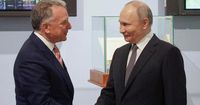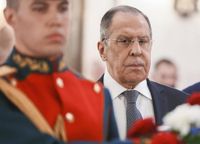In a tense backdrop of escalating military aggression, former U.S. President Donald Trump has indicated that he may impose additional sanctions on Russia if a ceasefire agreement regarding the ongoing conflict in Ukraine is not reached by the end of April 2025. This announcement comes as the situation on the ground remains dire, with recent reports indicating that Russian forces have launched a series of attacks on Ukraine, including the use of a missile and 39 drones in just 24 hours.
According to the Ukrainian Air Force, these attacks resulted in significant defensive actions, with Ukrainian air defenses successfully intercepting 24 enemy drones across various regions of the country. The ongoing conflict has seen a dramatic uptick in hostilities, with Ukrainian President Volodymyr Zelensky calling for urgent reinforcements as missile strikes from Moscow intensify.
In a recent meeting, Trump’s special envoy, Steve Witkoff, met with Russian President Vladimir Putin in St. Petersburg for over four hours, discussing potential resolutions to the crisis. Reports suggest that Witkoff advised Trump that recognizing the status of the four occupied regions—Donetsk, Luhansk, Kherson, and Zaporozhye—as part of Russia could expedite the ceasefire process. However, this proposal has not yet led to any definitive changes in U.S. policy.
During the meeting, Putin’s Foreign Minister, Sergey Lavrov, stressed the importance of normalizing relations between Russia and the United States, stating, "It is reasonable and essential to work for normalization based on mutual recognition and respect for each country's national interests." Lavrov expressed his belief that the United States is more willing than Europe to address the underlying issues of the conflict.
Additionally, Lavrov remarked on the significance of recent prisoner exchanges between the two nations, stating that such gestures can help build the trust that is desperately needed. The Kremlin confirmed that Witkoff's arrival in Russia was part of ongoing discussions aimed at resolving the Ukraine crisis.
Meanwhile, the Estonian Defense Minister, Hanno Pevkur, speculated that Moscow might aim to reach an agreement with the U.S. by May 9, 2025, a date of historical importance for Russia known as Victory Day, which commemorates the defeat of Nazi Germany. Pevkur noted that timing is crucial for the Kremlin and that they may be motivated to finalize discussions by this date.
In the wake of the intensified military actions, President Zelensky has reiterated the urgent need for advanced air defense systems, specifically requesting ten Patriot missile systems to protect Ukrainian civilians from ongoing attacks. "Our people, our children, are under attack in many cities and villages," he stated, emphasizing the critical need for enhanced aerial protection.
The conflict has drawn significant international attention, with NATO allies pledging over €21 billion in military aid to Ukraine this year alone. John Healey, the UK Defense Minister, highlighted the necessity for increased support, stating, "2025 is a critical year for Ukraine, and now is the time to ramp up our efforts."
As the situation evolves, the European Union is also considering measures to address potential vetoes from Hungary regarding the renewal of sanctions against Russia. Diplomatic sources indicate that a plan B is under discussion, which may involve individual nations implementing their own sanctions if the EU fails to reach a consensus.
In the midst of these developments, the Russian Ministry of Defense reported that their air defense units successfully shot down 13 Ukrainian drones within a span of 30 minutes, further illustrating the ongoing military escalation.
On the diplomatic front, Bridget Brink, the U.S. Ambassador to Ukraine, has announced her resignation after serving for three years, a decision that comes amid significant shifts in U.S. foreign policy towards Russia.
As the conflict continues, Zelensky remains adamant that Ukraine will not concede to Russian demands. "Ukraine is committed to maintaining its sovereignty and democratic principles, distinguishing itself from Russia, which has suppressed political opposition and manipulated electoral processes," he stated.
With the stakes higher than ever, the international community watches closely as negotiations unfold and military actions persist. The potential for a ceasefire remains uncertain, with both sides entrenched in their positions and the humanitarian toll mounting daily.
The urgency for a resolution is palpable, as the loss of life continues to escalate and the prospect of peace hangs in the balance. As Trump prepares to take decisive action, the world awaits to see if any agreements can be reached before the looming deadline.





